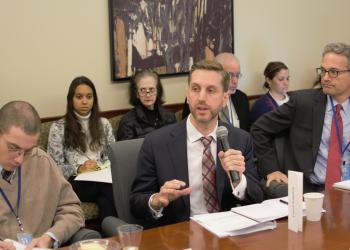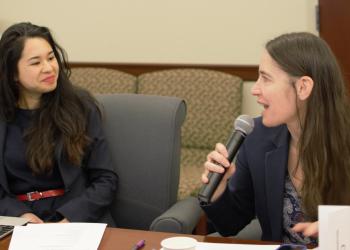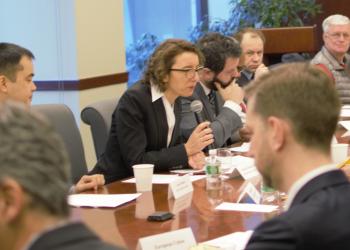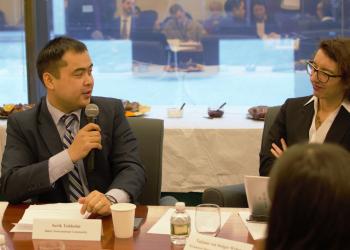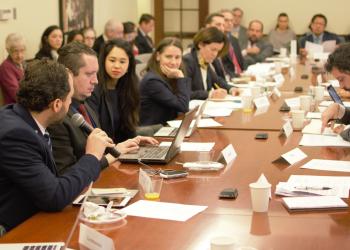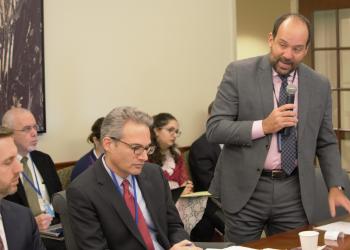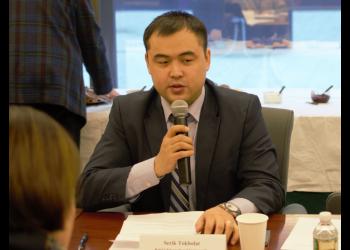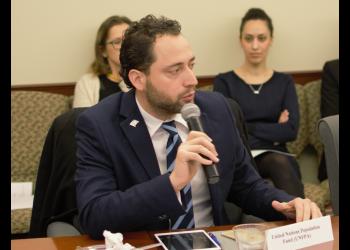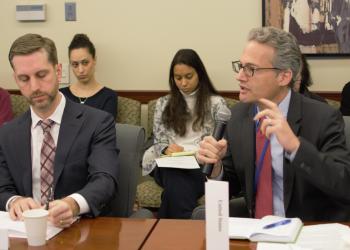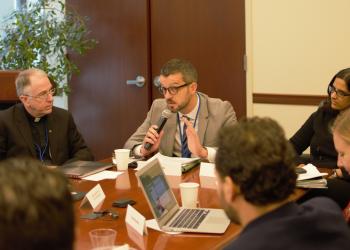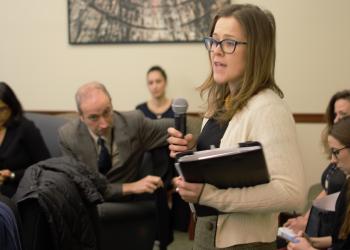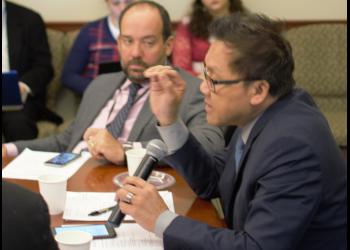High Level Political Forum needs to be inclusive, antidote to "silo thinking"
Successfully implementing and monitoring the new global plan for sustainable development, which has 17 broad goals and has since its adoption by the United Nations in September been known as Agenda 2030, will require integration, inclusion and coordination on a scale as never before. That much has long been clear, given the complexity and ambitious nature of the undertaking.
One big task now is how to flesh out the administration of such a vast project, which cuts across issues areas ranging from poverty reduction to climate change, from gender equality to peace and security.
Diplomats, UN officials and representatives of civil society were able to discuss this challenge at a breakfast meeting on 22 January 2016, which examined a new report from the UN Secretary General about how Agenda 2030 might be monitored and coordinated at the global level. That report focused on the role of the High Level Political Forum on Sustainable Development (HLPF), a relatively new entity that has been designated as the central platform for follow-up and review of Agenda 2030.
One important objective, said Tatjana von Steiger Weber, Minister, Permanent Mission of Switzerland to the United Nations, will be to maintain the deep involvement of civil society and other stakeholders as the process continues.
“We strongly believe that building on the bottom-up, inclusive approach of the post-2015 negotiations will be key in the next phase of implementation ... in order to reach out to everyone in the spirit of ‘leaving no one behind,” said Ms. von Steiger Weber, who was one of two keynote speakers at the breakfast meeting, which was held at the offices of the Baha’i International Community.
“We don’t think it will be helpful if we fall back into reading out long statements [at the HLPF],” she said. “For that we strongly believe that engaging with stakeholders on how to structure these dialogues is going to be key – because they are mirroring what people back home think is the right way to discuss these important issues.”
She also warned against falling into “the trap of silo thinking” as the HLPF discusses the implementation of Agenda 2030. “How do we ensure that we pay tribute to this integrated agenda, while not losing focus?” asked Ms. von Steiger Weber.
She noted that the UN has many agencies, commissions and departments that will need to work together across broad issue areas if Agenda 2030 is to reach its objectives. She said, for example, that the various UN commissions – such as the Commission on the Status of Women or the Commission for Social Development – will have roles to play. “In our view, they have the responsibility to discuss how they can contribute to Agenda 2030,” said Ms. von Steiger Weber.
The other keynote speaker was Marion Barthelemy, Chief, Intergovernmental Support Branch, Division for Sustainable Development, United Nations Department of Economic and Social Affairs. She was one of the authors of the Secretary General’s report, called “critical milestones towards coherent, efficient and inclusive follow-up and review at the global level” and referred to as the “Milestones” report.
The report was based on answers by UN member states and others to a series of questionnaires sent out by Ms. Barthelemy’s department as part of an effort to flesh out the role of the HLPF as Agenda 2030 moves forward.
The HLPF, she noted, was established in 2013 largely as a replacement for the Commission on Sustainable Development. When Agenda 2030 was adopted in September 2015, the General Assembly gave the HLPF a “central role” in follow-up and review at the global level – but indicated little else about how it should function.
As such, said Ms. Barthelemy, the Milestones report is a first effort to suggest how the HLPF might operate. Among other things, for example, the report says the HLPF should “work coherently with and benefit from the guidance and support of the UN General Assembly (UNGA) and the Economic and Social Council (ECOSOC) under whose auspices it meets.”
It must also draw on the expertise of regional political, economic and sectorial institutions, as well as the “wealth of organizations and actors” outside the UN system. And, overall, it must take a “holistic view of implementation” considering linkages across the 17 goals and their associated 169 targets.
“One of the messages of this report is that, indeed, we have the institutions and bodies [already in place] that we need to review progress on the Agenda,” said Ms. Barthelemy. But, also, that “given the Agenda’s international nature, these bodies cannot work in isolation from each other.”
She stressed this principle of coherence, saying “by this we mean that every part of the UN system and beyond must have some link to the others and contribute to the working of the other parts, with the HLPF at the center.”
For example, she said, “you can recognize the Framework Convention on Climate Change (UNFCCC) as the platform on climate change, but at the same time have some link whereby the advances in the area of climate change can feed into the HLPF and advances the Agenda in an integrated way.”
The meeting’s moderator, Serik Tokbolat, likewise stressed the importance of inclusiveness as the HLPF begins its work.
“Agenda 2030 belongs to all,” said Mr. Tokbolat, a representative of the Baha’i International Community to the United Nations. “While developing the Agenda, we thought a lot in terms of people’s participation. We said that no one should be left behind. Therefore, follow-up and review should include input from all people.”
The meeting was the 31st in a series sponsored by the Baha’i International Community and International Movement ATD Fourth World on the post-2015 development agenda. As always with these meetings, the discussion after the keynote speakers was held using Chatham House rules, so as to encourage a rich and forthright discussion among diplomats, UN officials and civil society.
Full notes of the meeting can be read here.
